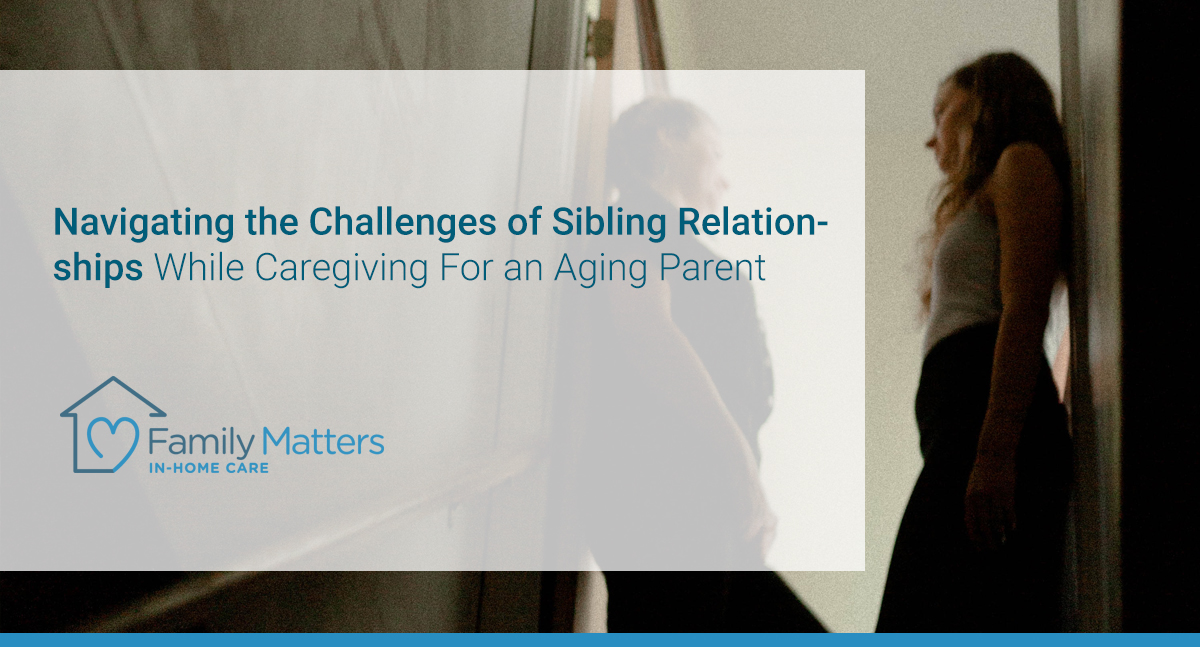
Navigating the Challenges of Sibling Relationships While Caregiving For an Aging Parent
Both you and your sibling love your aging parent. But taking care of your aging parent can sometimes cause stress and strain between you and your siblings. While this is normal, it doesn’t have to be your reality.
Sibling relationships are important throughout your life. You likely grew up with your siblings, so they know a lot about you and your personality.
Maintaining good relationships with your siblings can keep the whole family on good terms and ease the stress of long-term caregiving. Follow these tips to keep tension out of your sibling relationships as you care for your elderly parent.
Why Do Siblings Fight While Caring for Their Parents?
It is normal and even expected to have arguments with your siblings while you are caring for your aging parents.
Being a caregiver for a loved one is never easy. In fact, burnout is one of the most common mental health problems caregivers end up with. This happens when you have reached your social and emotional limit, but still feel obligated to complete caregiving duties.
So it makes sense that you would have some back-and-forth with your siblings. Most siblings do not see eye to eye on every issue in life, and elderly care is no different. When you are already stressed, it becomes difficult to keep your cool with everyone.
You may have a difference in opinion about how to best care for your parents. Maybe you feel like your sibling isn’t doing enough to help you. Your parents may show favoritism toward one sibling or another.
No matter what the conflict is about, you can rest assured knowing it can be resolved. You and your siblings can enjoy your remaining time with your parents while getting along and enjoying each other’s company, too.
Make a Fair Plan for Your Parents’ Care
Most sibling conflicts come up as you care for aging parents because someone feels like the arrangements are unfair.
If you are the sole caregiver for your parent(s), it makes sense that you would feel angry, frustrated, and perhaps even resentful toward your other siblings.
Similarly, you might feel like they attack you over small things because they are unhappy about having to do the majority of the care tasks for your parents.
You can bring balance back to your relationship by making a clear, organized, and fair plan for your parent’s care. Often, this means arranging in-home care for your loved one and stepping back from full-time caregiving duties.
You can make a weekly schedule that details who will visit your parents, help them around the house, or take care of their health-related tasks. Divide the labor between you and your other siblings so that everyone gets a break as often as they need.
Make sure all of your siblings agree on the plan before you put it into action. Everyone’s wishes should be included in the plan to keep things fair and calm.
Allow Open and Honest Communication
You and your siblings may suppress your emotions as you care for your elderly parents. But this can build feelings of resentment and anger over time. If you start talking about your feelings now, you can move past them quickly in the future.
Arrange for a meeting between you and your other siblings. Let everyone get their feelings out: the good, the bad, and the ugly. This should be a safe space for everyone to express their emotions freely, without judgment.
Once everyone has discussed how they feel, you can work toward solutions together. Many families end up arranging for in-home care for their aging parents because the burden of caregiving becomes too much for siblings.
This is nothing to be ashamed of. An in-home caregiver is a wonderful solution and helps keep your sibling relationships healthy and free of conflict.
Set Healthy Boundaries
Boundaries are important for maintaining your own mental health and emotional well-being. If you have a sibling who is difficult to be around, you must start setting boundaries with them.
Healthy boundaries look different for different families. You don’t have to cut your sibling off completely; sometimes, you just have to distance yourself.
Even if you are both caring for your parents, you can make interactions outside caregiving as brief as possible. This ensures that you don’t overextend yourself toward siblings who may not be healthy for you.
Be Open to Home Care
Caring for an aging parent is never easy. Professional home care services can assist your parents with the tasks of daily living so that you and your siblings have more time for your own responsibilities.
Everyone deserves help from time to time. By remaining open-minded toward the possibility of in-home care for your beloved parents, your sibling relationships can have the opportunity to improve.
If you or your family member is considering in-home care as part of a plan to age in place, contact Family Matters In-Home Care today for a free consultation. Our team is dedicated to supporting your family and helping older adults enjoy life in the comfort of their own home for as long as possible.
Some of the services offered by Family Matter In-Home Care include: Alzheimer’s & Dementia Care, Bed & Wheelchair Transfer Assistance, Companionship, Housekeeping & Meal Preparation, Personal Care, Recovery Care, and Transportation.
Serving the San Francisco Bay Area and Greater San Diego, Family Matter In-Home Care has offices throughout California including: Campbell, CA, Roseville, CA, San Marcos, CA, and San Mateo, CA.
